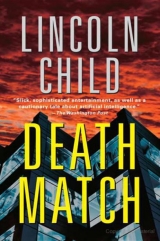
Текст книги "Death Match"
Автор книги: Lincoln Child
Соавторы: Lincoln Child
Жанр:
Триллеры
сообщить о нарушении
Текущая страница: 3 (всего у книги 26 страниц)
FIVE
Flagstaff, Arizona. Two days later.
T he carport was already taken up by two Audi A8s, so Lash left his rented Taurus at the curb and started up the flagstone walk. Brown pine needles crunched underfoot. 407 Cooper Drive was an attractive bungalow with a broad low roof and fenced backyard. Beyond the fence the hillside fell away, revealing a panorama of downtown, faintly blurred by morning mist. Behind and to the north rose the purple-and-brown bulk of the San Francisco Peaks.
Reaching the front door, Lash tucked several large envelopes under one arm and sounded his pocket for the key. He fished it out, white evidence tag dangling from its chain. The chief of the Phoenix field office had been a classmate in the drab gray dorms of Quantico and fellow-sufferer on the obstacle courses of the Yellow Brick Road, and owed him several favors. Lash had turned one of them in for the key to the Thorpes’ house.
He glanced up, noticing the security camera bolted beneath the eaves. It had been installed by the previous owner of the house and was deactivated for the police investigation. Since the house would go on the market once the investigation was officially closed, the system remained off.
Lash looked down again, fitted the key to the door, and unlocked it with a twist of his hand.
Inside, the house had that peculiar watchful, listening quality he found in homes that had seen unnatural death. The front door opened directly onto the living room, where the bodies had been found. Lash walked forward slowly, looking around, noting the location and quality of the furniture. There was a butternut-colored leather sofa with matching armchairs, an antique armoire, an expensive-looking flatscreen television: clearly, the Thorpes weren’t hard up for cash. Two beautiful silk rugs had been arranged over the wall-to-wall carpeting. One still bore powder traces from the medical examiner’s team. This unexpected sight stirred memories of the last crime scene he’d witnessed, and he moved quickly onward.
Beyond the living room, a hallway ran the width of the house. To his right was a dining room and kitchen; to his left, what looked like a couple of bedrooms. Lash dropped his envelopes on the sofa and walked down as far as the kitchen. It was as well appointed as the living room. There was another door here, with a view of the narrow side yard and the neighboring house.
Lash moved back up the hallway in the direction of the bedrooms. There was a nursery, all blue taffeta and lace; a master bedroom, its night tables littered with a typical assortment of paperback novels, medicine bottles, and television remotes; and a third room, which was apparently a guest room doubling as a study. He paused at this last room, looking around curiously. Japanese woodblock prints of thinnest rice paper decorated the walls. On a desk sat several framed photographs: Lewis and Lindsay Thorpe, arm in arm in front of a pagoda; the Thorpes again, standing on what looked like the Champs-Elysées. In each photo, the couple was smiling. He’d seen smiles like that before, rarely: simple, unfeigned, undiluted happiness.
He moved to the far wall, which was completely taken up by bookshelves. The Thorpes had been eclectic, voracious readers. Two upper shelves were completely taken up with textbooks in varying degrees of decrepitude; another with trade journals. Below these were several shelves of fiction.
One shelf in particular caught Lash’s eye. The books here seemed to be given preferential treatment, bookended by statues of carven jade. He glanced over the titles: Zen and the Art of Archery, Advanced Japanese, Two Hundred Poems of the Early T’Ang. The shelf above it was empty except for an unframed picture of Lindsay Thorpe riding a merry-go-round, surrounded by children, laughing as she stretched her arm toward the camera. He picked it up. On the back had been scrawled, in a masculine hand:
I wish I were close
To you as the wet skirt of
A salt girl to her body.
I think of you always.
He carefully replaced the photo, exited the study, and returned to the living room.
Outside, the morning mist was quickly burning off, and slanted bars of sunlight now lay across the silk rugs. Lash moved to the leather sofa, pushed the envelopes aside, and sat down. He’d done this many times before, as an agent with the Investigative Support Unit: gone through a house, trying to get a feel for the pathology of its occupants. But that had been very different. He’d been doing criminal personality profiles for NCACP, studying the personal hells of mass murderers, serial rapists, “blitz” attackers, sociopaths. People, and houses, who had absolutely nothing in common with the Thorpes.
He’d come here in search of clues to what had gone wrong. Over the last three days, he had performed what clinicians referred to as a psychological autopsy, conducting discreet interviews with family members, friends, doctors, even a minister. And what had at first seemed like an easy case formulation quickly turned otherwise. There were none of the stressors, the risk factors, normally associated with suicide. No history of prior attempts. No history of psychiatric disorders. Nothing that should have triggered one, let alone two, suicides. On the contrary, the Thorpes had everything to live for. And yet, in this very room, they had written a note, tied dry cleaning bags around their heads, embraced on the carpet, and asphyxiated themselves in front of their infant girl.
Lash pulled one of the two envelopes toward him, ripped it open with the edge of a finger, and dumped the contents onto the couch: documentary evidence compiled by the Flagstaff police. There was a thin packet of glossy photographs held together with a clip, and he leafed through them – scene-of-crime photos of the husband and wife, together in death, rigid on the beautiful carpet. He put down the eight-by-tens and picked up a photocopy of the suicide note. It read simply, “Please look after our daughter.”
A thicker document lay nearby: the official police incident report. Lash turned its pages slowly. Neither husband nor wife had left the house since the night before their bodies were discovered. The tapes of the external security cameras revealed nobody else had come to the house in the interim. The silent alarm was triggered only by a curious neighbor the next morning. At the back of the report was a transcript of an interview with this neighbor.
OFFICIAL TRANSCRIPT
PROPERTY OF FLAGSTAFF POLICE DEPARTMENT
Docket: AR-27
Case No.: 04B-2190
OIC: Det. Michael Guierrez
Int. Officer: Sgt. Theodore White
Subj: Bowman, Maureen A.
Date / Time: 9/17/04 14:22
=============================
EZ-Scrip Transcription Follows
=============================
IO Please make yourself comfortable. My name is Sergeant White, and I’ll be conducting the interview. If you would please state your name for the record.
S Maureen Bowman.
IO Your address, Ms. Bowman?
S I live at 409 Cooper Drive.
IO How long have you known Lewis and Lindsay Thorpe?
S Since they moved into the neighborhood. Not all that long, a year and a half, maybe.
IO Did you see much of them?
S Not really. They were very busy, what with the new baby and all.
IO Did they have many regular visitors?
S None that I noticed. There were some people from the lab that Lewis was friendly with. I think they came over for a couple of dinner parties. After the baby was born, the grandparents visited a couple of times. Things like that.
IO And how did the Thorpes seem?
S How do you mean?
IO As neighbors, as a couple. How did they seem?
S They were always very pleasant.
IO Did you ever observe any problems? Arguments, raised voices, anything of the sort?
S No, never.
IO Were they ever in any kind of difficulty that you were aware of? Money, for example?
S No, not that I know. We never really spent that much time together, as I said. They were always very pleasant, very happy. I don’t think I’ve ever seen a couple happier.
IO What, precisely, made you go over to the Thorpe residence this morning?
S The baby.
IO I’m sorry?
S The baby. She was crying, wouldn’t stop. The baby had never cried before. I thought maybe something was wrong.
IO Describe, for the tape, what you found, please.
S I–I went in the kitchen door. The baby was there.
IO In the kitchen?
S No, in the hallway. The hallway leading from the dining room.
IO Ms. Bowman, please describe everything you saw and heard. In detail, please.
S Okay. I could see the baby, ahead, past the kitchen. She was screaming, her face was red. There weren’t any lights on, but it was a bright morning, I could see everything clearly. There was some kind of opera playing.
IO Playing where?
S On the stereo. But the baby was crying so loudly. I could barely think. I moved ahead to comfort her. That’s when the living room came into view. That’s when I saw… oh, God…
[TRANSCRIPT PAUSES]
IO Take as long as you need, Ms. Bowman. You’ll find tissue to your right, on the table, there.
Lash put the transcript aside. He didn’t need to read any more: he knew exactly what it was Maureen Bowman saw.
I don’t think I’ve ever seen a couple happier. It was just about the same thing, word for word, Lindsay Thorpe’s father had told him, with those hollow, haunted eyes, at the restaurant in New London. The same thing everybody had told him since.
What had gone wrong with this couple? What had happened?
Lash’s experience with pathology had two very distinct periods: first as a forensic psychologist with the FBI, studying violence after the fact; and then later, as a specialist in private practice, working with people to make sure violence never became a necessary option. He had worked very hard to keep the two worlds separate. Yet here in this house he felt them drawing together.
He dropped his gaze to the other envelope: the one imprinted Property of Eden Inc. Proprietary and Confidential. He unwound the sealing thread, opened the flap. Inside were two unlabeled videotapes. Lash slid them out, balanced one in each hand for a moment. Then he rose and walked to the television console. He turned it on, inserted one of the tapes.
A date resolved on the black screen, followed by a long scroll of numbers. And then a face appeared suddenly, larger than life: brown hair, penetrating hazel eyes, handsome. It was Lewis Thorpe, and he was smiling.
The first step in any application to Eden was to sit before a camera and answer two questions. Besides the scant biographical information, these initial tapes of the Thorpes were the only material Mauchly had supplied him with.
Lash turned his attention to the tape. He had watched it and its mate several times before. Here in the Thorpes’ own house he would watch them one last time, in hopes the surroundings would somehow render up the connection that so far had eluded him. It seemed a vain hope, but he was running out of options – and spending a lot more time – than he had ever intended.
“Why are you here?” an off-camera voice was asking.
Lewis Thorpe had a frank, disarming smile. “I’m here because something is missing in my life,” he said simply.
“Describe one thing you did this morning,” the off-camera voice said. “And why you think we should know about it.”
Lewis thought for just a moment. “I finished translating a particularly difficult haiku,” he said. He waited, as if for a response. When none came, he went on. “I’ve been translating the work of Bash – o, the Japanese poet. People always think translating haiku must be easy, but in fact it’s really, really hard. It’s so dense, yet so simple. How do you capture that wealth of meaning?” He shrugged at the camera. “It’s something I started doing in grad school. I’d taken a lot of Japanese courses, and I was really taken with Bash – o’s book, Narrow Road to the Interior. It’s the story of this journey he took through Japan’s northern interior four hundred years ago. But, of course, it’s also about his own… Anyway, it’s a short work, laced with haiku. There was one in particular, a famous one, that I struggled with, kept putting off. This morning, on the taxi coming here, I finally finished it. Sounds funny, doesn’t it, since it’s only, what, nine words long?” He stopped.
It was hard to reconcile the handsome face with that other one, shown in the police photos: the yawning mouth, the wide unseeing eyes, the dark lolling tongue.
Sudden fade to black. Lash withdrew the tape, slotted in the other.
Another scribble of numbers. Then Lindsay Thorpe appeared on the monitor, thin and blonde and deeply tanned. She looked a trifle more nervous than Lewis had. She licked her lips, traced an errant hair away from her eyes with a finger.
“Why are you here?” the off-camera voice asked again.
Lindsay paused for a moment, looked away. “Because I know I can do better,” she replied after a moment.
“Describe one thing you did this morning. And why you think we should know about it.”
Lindsay looked back at the camera. And now she smiled too, displaying perfect, gleaming teeth. “That one’s easier. I took the plunge, bought my round-trip ticket to Lucerne. There’s this special tour group taking a one-week hike through the Alps. It’s kind of expensive, seemed like a bit of an extravagance, especially on top of the fee for…” Her smile turned a little shy. “Anyway, I finally decided I was worth it. I recently ended this relationship that just hadn’t been working out, and I wanted to get away, maybe get a little perspective on things.” She laughed. “So I put the ticket on my Visa this morning. Nonrefundable. I leave the first of next month.”
The tape ended. Lash removed it and shut off the player.
Five months after these interviews, the Thorpes were married. They moved here not long after. The most perfect couple anyone could remember.
Lash dropped the tapes into the envelope and started for the door. As he opened it he paused to turn back, asking once again for an answer. When the house remained silent, he shut and locked the door carefully behind him.
SIX
Cruising at thirty-five thousand feet on his way back to New York, Lash inserted his credit card into the seatback slot, plucked the air-to-ground phone from its handset, and stared at it a moment. What does an expert do when something makes no sense?he thought. Simple. You ask another expert.
His first call was to directory information; the second to a number in Putnam County, New York.
“Weisenbaum Center,” came a clipped, efficient voice.
“Dr. Goodkind, please.”
“Who may I say is calling?”
“Christopher Lash.”
“Just a minute.”
Among private psychologists, the Norman J. Weisenbaum Center for Biomedical Research was both revered and envied for the quality of its neurochemical studies. As Lash waited through ethereal, New Age music, he tried to picture the center in his mind. He knew it was located on the Hudson River about forty-five minutes north of Manhattan. No doubt beautiful, with impeccable architecture: the center was a darling of both hospitals and pharmaceutical companies, and was lavishly funded.
“Chris!” came Goodkind’s cheery voice. “I can’t believe it. I haven’t heard from you in, what, six years?”
“Must be that long.”
“How are you enjoying private practice?”
“The hours are better.”
“I’ll bet. I always wondered when you’d give up riding with the cavalry, settle down in some nice, lucrative town. You’re practicing in Fairfield, right?”
“Stamford.”
“Yes, of course. Close to Greenwich, Southport, New Canaan. All full of rich, dysfunctional couples, no doubt. Excellent choice.” Old U. Penn classmates like Goodkind had been divided in their opinions on Lash joining the FBI. Some seemed envious. Others shook their heads, unable to comprehend why he’d willingly take on such a stressful, physically demanding, potentially dangerous job when his doctorate entitled him to something a lot cushier. When he did leave the FBI, he’d been careful to let them believe greed was the motivating factor – rather than the tragedy that so abruptly ended both his law enforcement career and his marriage.
“You hear much from Shirley?” Goodkind asked.
“Nope.”
“Shame you two split up. It didn’t have to do with, what, that Edmund Wyre business, did it? I read about that in the paper.”
Lash was careful to keep his voice from betraying the pain that, even three years later, mention of that name could evoke. “No, nothing like that.”
“Horrible. Horrible. Must’ve been rough on you.”
“Wasn’t easy.” Lash began to feel sorry he’d called. How could he have forgotten Goodkind’s curiosity, his love of prying into the personal affairs of others?
“I picked up that book of yours,” Goodkind said. “ Congruency. Excellent stuff, though of course you were writing for the unwashed.”
“I wanted to sell more than a dozen copies.”
“And?”
“Sold two dozen, at least.”
Goodkind laughed.
“I read your recent article, too,” Lash went on. “In the American Journal of Neurobiology. ‘Cognitive Reappraisal and Agenerative Suicide.’ Nicely argued.”
“One thing about my position here at the center is I can specialize in the research of my choice.”
“I was also interested in some of your other recent papers. ‘Reuptake Inhibitors and Elder Suicide,’ for example.”
“Really?” Goodkind sounded surprised. “I had no idea you were keeping such close tabs.”
“I infer from the articles that, in addition to the lab research, you’ve interviewed quite a number of suicide attempters?”
“Well, I haven’t had a chance to talk with too many suicide completers.” Goodkind chuckled at his little joke.
“Including survivors of double suicides?”
“Of course.”
“Then there’s something I’m looking into that might interest you. In fact, I could use your advice. These friends of a patient of mine, a couple. Committed double suicide recently.”
“Successfully?”
“There are some unusual aspects to the pathology.”
“Such as?”
Lash pretended to hesitate. “Well, what if we turned it around, and you speculated – based on your research, of course – what the motivating factors might have been. Perform a psychological autopsy on the couple. I’ll fill in the blanks.”
There was a brief silence. “Sure, why not. What were their ages?”
“Early thirties.”
“Employment history?”
“Stable.”
“Psychiatric history? Mood disorders?”
“None known.”
“Suicidal ideation?”
“No.”
“History of prior attempts?”
“None.”
“Substance abuse?”
“The autopsy bloods were clean.”
Another pause. “Is this a joke?”
“No. Go on, please.”
“The couple’s relationship?”
“Warm and loving, by all accounts.”
“Major losses of any kind?”
“No.”
“Family history?”
“Negative for depression, schizophrenia, any mental illness, in fact.”
“Any other life stressors? Significant changes?”
“No.”
“Any health issues?”
“Both received glowing physicals within the last six months.”
“Anything I should know? Anything at all?”
Lash paused. “They’d recently had a child.”
“And?”
“Normal and healthy in every way.”
There was a long silence. Then, Lash heard laughter over the line. “This is a joke, right? Because these aren’t double suicides you’re describing. This is Captain America and Wonder Woman.”
“Is that your considered opinion?”
Goodkind’s laugh slowly died. “Yes.”
“Roger, you’ve got a unique perspective on suicide. You’re a biochemist. You not only talk to suicide attempters, you study their motivation on a molecular level.” Lash shifted in his seat. “Is there any commonality among people that might predispose them – no matter how happy they appear – to suicide?”
“You mean, like a suicide gene? I wish it were that easy. There’s research that’s shown some genes may– may—code for depressive tendencies. Just as there are genes that code for heavy eating, sexual preferences, eye or hair color. But predicting suicide? If you’re a betting man, stay away from that one. You’ve got two deeply depressed people. Why does one commit suicide and another doesn’t? In the end there’s no way to predict. Why did Miami Beach police report a rash of suicides last month, while Minneapolis had a historic dip? Why did Poland have a dramatically high rate of suicide in the year 2000? Sorry, pal. When you get right down to it, it’s just a roll of the dice.”
Lash ingested this. “A roll of the dice.”
“Take it from an expert, Chris. And you can quote me on that.”








